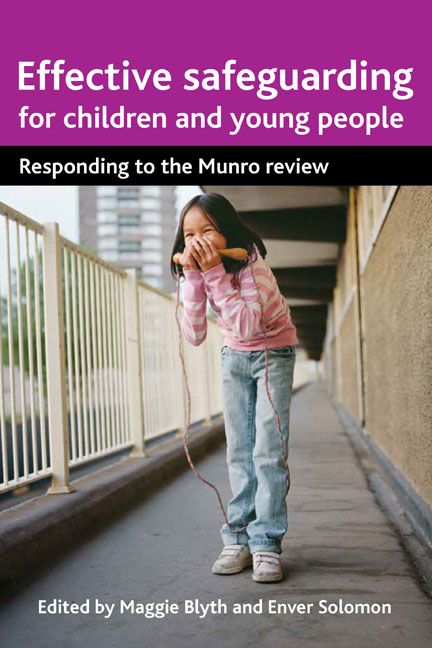Book contents
- Frontmatter
- Contents
- List of abbreviations
- Notes on contributors
- Acknowledgements
- Foreword
- one Early intervention
- two Local safeguarding children boards: faith, hope and evidence
- three The child's voice in the child protection system
- four Parental mental health, risk and child protection: what does Munro mean to child protection and adult mental health?
- five Adolescent-to-parent abuse and frontline service responses: does Munro matter?
- six Older children and the child protection system
- seven Serious case review
- Index
one - Early intervention
Published online by Cambridge University Press: 07 September 2022
- Frontmatter
- Contents
- List of abbreviations
- Notes on contributors
- Acknowledgements
- Foreword
- one Early intervention
- two Local safeguarding children boards: faith, hope and evidence
- three The child's voice in the child protection system
- four Parental mental health, risk and child protection: what does Munro mean to child protection and adult mental health?
- five Adolescent-to-parent abuse and frontline service responses: does Munro matter?
- six Older children and the child protection system
- seven Serious case review
- Index
Summary
Introduction
What do we mean by early intervention? As Eileen Munro (2011) sets out in her review of child protection, the term ‘early intervention’, or as she prefers ‘early help’, is ambiguous and open to a wide range of interpretations. In this chapter I will follow her lead and take the term to refer to both intervention early in a child's life and to intervention early in the development of a problem or vulnerability, whatever the age of the child or young person. My focus will be on early intervention in relation to safeguarding children from harm arising from poor or dangerous or neglectful parental care rather than other sources of harm. With that focus, the chapter is aligned to, considers and develops some of the issues raised in chapter 5 of the Munro Review (2011: 69), ‘Sharing responsibility for the provision of early help’.
There is a wealth of material on the benefits of early intervention in the scope of the meaning of the term described above. Recent reviews by Graham Allen MP, Dame Clare Tickell and Frank Field, evaluation of the Sure Start programme, the EPPE study and other UK work, as well as considerable historical research from the US and other countries, all support the moral and financial case for various kinds of early intervention (Institute of Education, 1999–2008; DfE, 2002–11; Allen, 2011; Tickell, 2011; Field, 2011). The Marmot Review (Marmot, 2010) demonstrated unequivocally the link between positive early development and whole of life health. The Every Child Matters programme was based on the premise that the best protection for all children is through access to high-quality universal services, the most comprehensive form of early help. Past and current government focus on educational attainment is the most visible expression of this. It is based on the strong evidence that education can be life-changing, that attainment at 16 years is a key indicator of life chances and that there are links between wider health and wellbeing and educational attainment. We have evidence of the positive impact of targeted programmes such as the Family Nurse Partnership, the Reading Recovery programme and the positive parenting (Triple P) programme developed by the Parent and Family Support Centre at the University of Queensland.
- Type
- Chapter
- Information
- Effective Safeguarding for Children and Young PeopleWhat Next after Munro?, pp. 9 - 24Publisher: Bristol University PressPrint publication year: 2012



